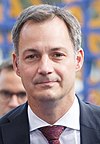User:Lyonsland/sandbox
Jump to navigation
Jump to search
This article lists political parties in Hennehouwe.
Parties with federal representation
| Party logo | Party name | Leader | Seats in the Chamber of Representatives |
Seats in the Senate |
Seats in regional assemblies |
Seats in the Euclean Parliament |
Ideology | |
|---|---|---|---|---|---|---|---|---|

|
Socialist Labour Party (SAP) Socialistische Arbeiderspartij |
 Rupert van Bleiswijk |
0 / 180
|
0 / 60
|
0 / 545
|
0 / 26
|
||
| The SAP was founded in 1918, and is the oldest party currently in existence in Hennehouwe. The party was formed from an amalgamation of the Social Democratic Party, Working People's League and the political wing of HAVA, the largest trade union in Hennehouwe. Initially a more left-wing revisionist socialist party, the SAP moved towards more centre-left oriented social democratic policies following the Great War. The SAP was instrumental in the shaping of the early days of the Third Republic, instituting a welfare state and a number of other socialist policies. Since the 1980's, the party has become more neoliberal in its platform, favouring a social market economy. Since the founding of the Third Republic, the SAP has been in government more than any other party, and has always finished either first or second in federal elections. Its main vote base includes the working class, voters in urban areas and maintains a broad age demographic of voters. | ||||||||

|
Progressive Democratic Party (VDP) Vooruitstrevende Democratische Partij |
tbd | 0 / 180
|
0 / 60
|
0 / 545
|
0 / 26
|
||
| A merger of the Liberal Democratic Party and the Radical Centre, the VDP was formed in 1989. The party is considered to be the successor of the liberal political movement following the erosion of pillarisation. The VDP advocates for liberal and progressive policies, balancing increasing social liberalism with economically liberal policies. It supports the retention of the welfare state, whilst also providing for privatisation of state assets and an open economy. The VDP also staunchly support membership of the EC, pursuing further integration and co-operation. Since its founding, the VDP has formed part of both SAP and NVP-led governments, and has surpassed the latter to become the second-largest party on a federal level. The party enjoys a broad coalition of support from the middle-class, traditionally liberal voters as well as significant pockets of the Petois and Estmerish minorities. | ||||||||

|
National People's Party (NVP) Nationale Volkspartij |
tbd | 0 / 180
|
0 / 60
|
0 / 545
|
0 / 26
|
||
| The NVP was formed from the merger of the Catholic National Sotirian Party and the Amendist Party of the Right in 1961, unifying the formerly sectarian parts of the Sotirian democratic wing of Hennish politics. The party's main principle is Sotirian democracy, but maintains a large broadchurch of different factions including liberal and conservative groupings. For most of its history, the NVP was one of the two major parties in Hennehouwe alongside the SAP. However, the party fell to third place in the 2017 federal election. Under the leadership of Fabian van Aitzema, the party has moved in a rightward direction in an attempt to prevent the further loss of votes to other right-wing parties. The NVP has a broad electorate, but is particularly strong amongst the religious, elderly and those from more affluent backgrounds. The party's strongest support is in rural areas, especially in Flamia. Under the leadership of van Aitzema, the NVP has also attempted to court working class voters concerned about immigration and the economy. | ||||||||

|
Patriot's March (MdP) Mers der Patriotten |
tbd | 0 / 180
|
0 / 60
|
0 / 545
|
0 / 26
|
||
| The Patriot's March are a far-right nationalist party. It was founded in 2006 following a split in the Patriotic Movement (PB), over concerns that the latter had become too extreme. Despite this, the policies of the Patriot's March are broadly identical to the former PB. The party opposes mass immigration, and pledges to restrict the entry of migrants from non-Euclean countries. The party opposes multiculturalism and supports tougher law and order policies. The MdP has also advocated for a Hennish withdrawal from the Euclean Community. has Economically, the party is more centrist, supporting welfare state policies with a "Hennish First" attitude towards housing, healthcare and employment. The March, like its predecessor, have been widely accused of xenophobia and bigotry. Almost all other parties have continued the cordon sanitaire against the March that applied originally to the PB. Nevertheless, support for the party has grown steadily in recent years. Following the 2018 elections, the MdP is the fourth largest party in the Chamber. | ||||||||
| Green Party (Groen) Groen Partij |
tbd | 0 / 180
|
0 / 60
|
0 / 545
|
0 / 26
|
|||
| The Green Party was formed in 1988 following a consolidation of smaller green parties and other envrionmentalist groups. Its core focus is environmental issues, with an emphasis on climate action. The party takes a centre-left stance on most other issues, and supports continued integration with the Euclean Community. Internally, the party consists of a amongst a number of factions, primarily the more centre-left wing, and the more left-leaning 'red greens'. Since its creation, the Greens have favoured SAP-led governments. It took part in a coalition between 20XX and 20XX, and supported most other SAP-led governments via confidence and supply arrangements with the exception of the incumbent government. In recent years, the party has experienced an increase in support similar to other green parties in eastern Euclea, gaining ground in regional assemblies. The party finds its greatest levels of support amongst urban voters, affluent suburbanites and students. | ||||||||

|
The Left (Links) Links |
tbd | 0 / 180
|
0 / 60
|
0 / 545
|
0 / 26
|
||
| Founded in 1992 as a political alliance of multiple larger and smaller parties including the Hennish Section of the Workers' International (HSAI), The Left sought to provide a united political front for Hennish socialists and communists. In that time, the united party has moved away from the more hardline, authoritarian socialism espoused in other countries in favour of democratic socialism. The Left has also co-opted more modern platforms, including eco-socialism and feminism. Since the foundation of the Left, the cordon sannitaire imposed on some of its predecessor(s) by other parties has more or less vanished, though The Left has yet to form part of a federal government. Its support is mostly derived from traditional socialists, younger voters and some trade unionists. | ||||||||

|
People's Party for Sotirian Democracy (VSD) Volkspartij voor Sotirilijk Democratie |
tbd | 0 / 180
|
0 / 60
|
0 / 545
|
0 / 26
|
||
| The VSD is a product of a split during the early years of the NVP by a fundamentalist group within the Amendist faction of the newly-united party. The party identifies itself as a Sotirian party, and is closely affiliated with several Amendist churches in Hennehouwe. The VSD is strongly socially conservative, opposing euthanasia, abortion and same-sex marriage, and supports the reintroduction of conscription and the death penalty. The party taks a broadly conservative stance on most economic issues, including lower taxation and deregulation. The VSD also claim to support environmental action and asylum seekers. Its primary support is derived from the so-called Amendist belt in rural Stegeren and Grotevlakte, but the party has also made attempts to attract Catholic voters. | ||||||||
| File:Petois Party logo.png | Party for the Petois (PP) Parti pour le petois Partij voor de Petois |
tbd | 0 / 180
|
0 / 60
|
0 / 545
|
0 / 26
|
||
| The modern carnation of the Petois political movement, the PP is the most popular party among the ethnically Gaullican Petois people in southern Hennehouwe. It advocates for regional issues and general Petois interests. Unlike some of its predecessors, the PP do not support Petois nationalism, but do support greater autonomy and the creation of a distinct Petois region within Hennehouwe. The party refers to itself as a big tent, with most of its policies falling in the political centre. The PP only contest elections in areas with sizeable Petois populations, primarily in the Petois-majority region of Molenburg, as well as southern Flamia and Oudkessel-Witburg. | ||||||||
| Agrarian–Farmer's Party (ABP) Agrarische Boerenpartij |
tbd | 0 / 180
|
0 / 60
|
0 / 545
|
0 / 26
|
|||
| A centre-right party focused on rural issues, the ABP was founded in 1960. The party operates on a platform of upholding the interests of farmers and rural communities in Hennehouwe. It supports increased subsidies for farmers and the agriculture sector, financial development in rural areas and decentralisation. Predictably, the ABP's support base is concentrated in rural areas. It has maintained a stable electorate throughout its history, winning between 2 and 6% of the national vote. | ||||||||
| LIVE – The Liberal Union (LIVE) LIVE - De Liberale Verbond |
tbd | 0 / 180
|
0 / 60
|
0 / 545
|
0 / 26
|
|||
| LIVE was founded by entrepreneur Rinus Marsman in 2006, and facilitated by an exodus of the right-wing of the VDP. It positioned itself as a political alternative, advocating individual liberties and freedoms, entrepreneurship and a sustainable economy. The party had a promising start, winning 11% of the vote and 15 seats in the 2007 federal election. However, the party has since lost much of its support due to the resurgence of the VDP to the party's left, and the MdP to its right. | ||||||||